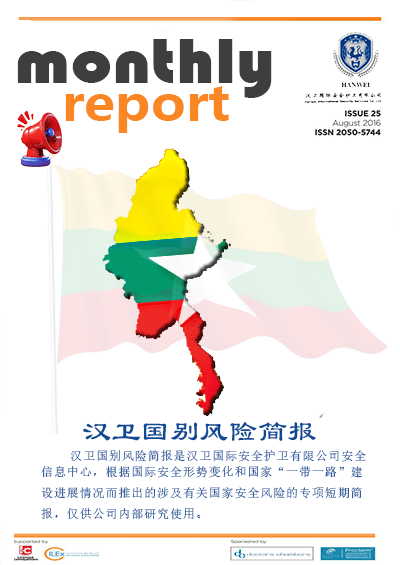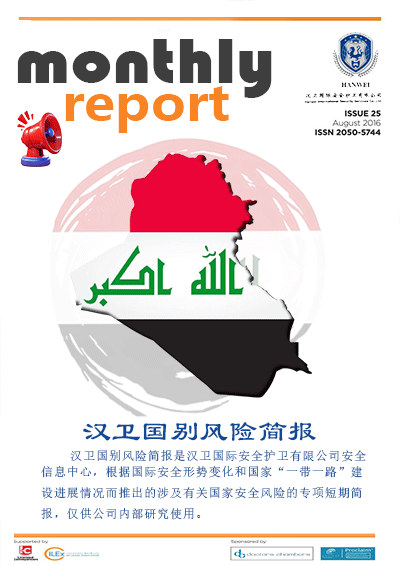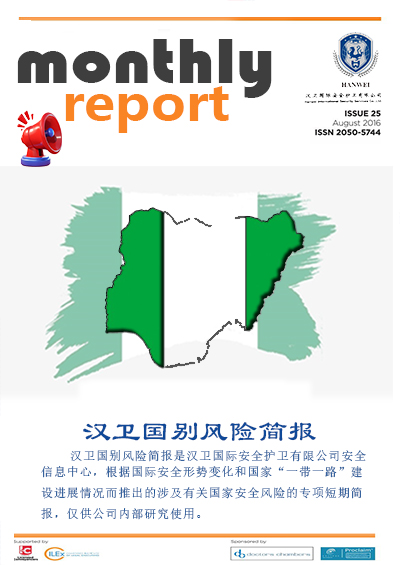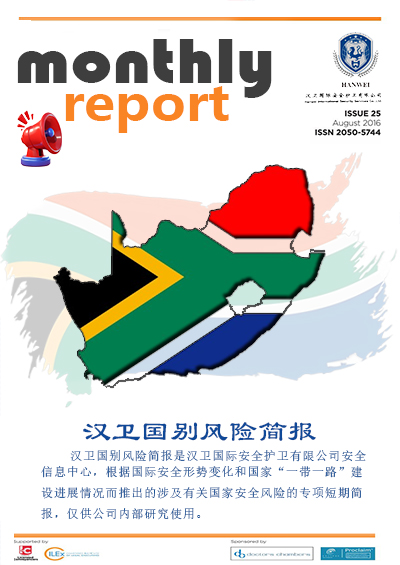Researcher No. 007
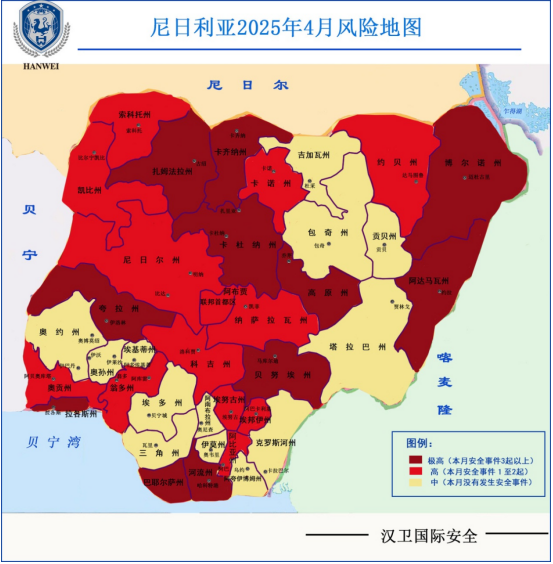
ccording to the monitoring report of the security Officer of Hanwei International stationed in West Africa and comprehensive media reports, a total of 80 security incidents occurred in Nigeria in April 2025. A total of 401 civilians and 38 military and police personnel were killed in various security incidents, and at least 224 people were kidnapped. The types of security incidents mainly include armed attacks and kidnappings, demonstrations and public safety accidents, etc. Compared with last month, the number of security incidents increased by 10, the death toll rose by 217, and the number of kidnappings increased by 27. Analysis suggests that the security situation in Nigeria has further deteriorated this month, with large-scale armed attacks and kidnappings breaking out in the central and northeastern regions, causing significant casualties. In particular, an incident occurred where a vehicle of a Chinese-funded enterprise was attacked and a Chinese citizen was kidnapped, resulting in the deaths of two Chinese citizens and the kidnapping of one. The severe security situation in Nigeria has drawn the attention of the international community. The Chinese Embassy in Nepal has also issued multiple safety reminders not to travel to high-risk areas. In response to this, Nigerian President Bora Tinub issued an order to security agencies on April 23, demanding that the military do its best to address domestic security issues.
I. Comprehensive Analysis of Security Incidents
Among the 80 security incidents that occurred in Nigeria in April, 41 were armed attacks, accounting for 51% of the total. There were 20 cases of armed kidnapping, accounting for 25%. There were 9 public safety incidents, accounting for 11%. There was one armed conflict among nomads, accounting for 1%. There were five demonstrations, accounting for 6%. There were four military clearance operations, accounting for 5%. A total of 556 people were killed and at least 224 were kidnapped in various incidents. Among the deceased, there were 401 civilians, 38 military and police personnel, and 117 terrorists were killed.
The overall security situation presents the following characteristics:
(1) The security risks in the central and northeastern regions are extremely high.In April, security incidents in Nigeria were mainly concentrated in Benue State in the central part and Borno State in the northeastern part. Meanwhile, the central and western states of Zamfarah, Kaduna, and Katina, as well as the central-southern states of Rivers and Bayelsa, are also high-risk areas. Among them, the central Benue state has the highest security risk, with a total of 13 security incidents, resulting in 66 deaths and 32 kidnappings. Benue State is located in central Nigeria, and 70% of its population is engaged in agriculture. In recent years, due to climate change and population expansion, farmland and grazing land in central Nigeria, including Benue State, have been continuously decreasing. Herders and farmers often have conflicts over land use issues. In light of the current frequent attacks, James Melvin Eger, the chairperson of the Agatu Local Government District in Benue State, issued an ultimatum to the Fulani herders on April 26, asking them to evacuate their farmland within a week to ensure the safety of agricultural production during the upcoming planting season. Seven security incidents occurred in Borno State in the northeastern part, mainly armed attacks and kidnappings, resulting in 62 deaths and 10 kidnappings. This month, the security situation in Borno State is extremely severe. On April 8th, when meeting with security forces in Maiduguri, the capital of Borno State, the governor of Borno State, Babagana Zarum, confirmed that the extremist group "Boko Haram" is making a comeback, frequently launching attacks and kidnappings in Borno State, causing a large number of casualties and property losses. The local people have been displaced and the humanitarian crisis is severe. On April 25th, the governor of Borno State once again stated that the "Islamic State West Africa Province" (ISWAP) and Boko Haram armed groups are regrouping in the Tunbus waters of Lake Chad and the Mandala Mountains in the Sanpisa Forest. If the Sahel region loses control, it will threaten the overall security of Nigeria. In addition, due to the continuous occurrence of attacks, the governor of Plateau State, Kaleb Mutfuwan, announced that night grazing would be banned starting from April 16th, and the use of motorcycles would be prohibited throughout the state from 7 p.m. to 6 a.m.
Figure 1: Distribution Diagram of Security Incidents in April
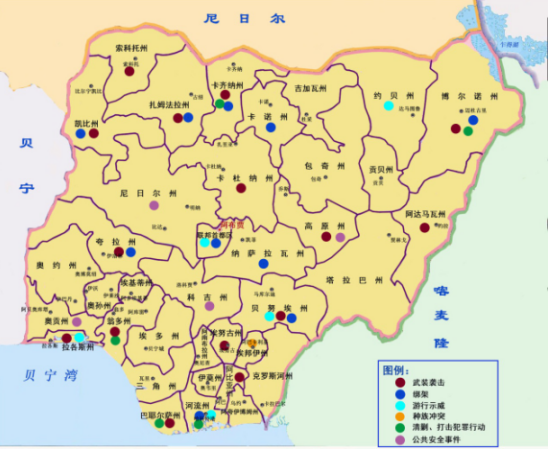
Chart 1: Statistics of Security Incidents in Major Regions in April
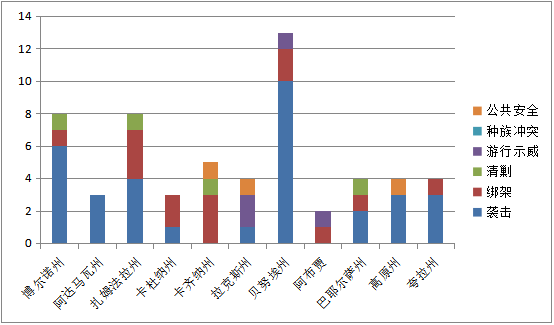
(2) Armed attacks and kidnappings continue to occur frequently.In April, there were as many as 61 armed attacks and kidnappings in Nigeria, resulting in 387 deaths and 224 kidnappings. The number of incidents has increased by 9 compared to last month, the death toll has risen by 222, and the number of kidnappings has increased by 27, reaching the highest point of this year. Among them, on April 2nd, the Bokos area in the Central Plateau State of Nigeria was attacked by armed forces, resulting in at least 52 deaths. On April 3rd, an 18-seat bus belonging to Benue Links Transport Company, which is owned by the Benue State Government, was attacked by suspected armed personnel in the Ikobi community of the Otukpo Local Government District (LGA) of the state, resulting in the death of one driver and one passenger, and 13 passengers were kidnapped. From April 5th to 6th, two villages in Kazina State and two villages in Zamfarah State were successively attacked by armed forces, resulting in at least 86 deaths and 119 kidnappings. On April 10th, a passing vehicle along the Damboa-Maiduguri highway in Borno State triggered an improvised explosive device laid by the extremist group Boko Haram, resulting in 15 civilian deaths and 28 injuries. On April 13th, two attacks occurred in Plateau State, Nigeria, resulting in at least 60 deaths. On April 15th, a community in Benue State was attacked by suspected armed herders, resulting in 11 deaths, multiple injuries and the destruction of many houses. On April 16th, armed bandits attacked the Kemaanji community in the Kaiama local government area of Kwara State, resulting in the deaths of at least 15 local security guards and residents. On April 22 and 24, a gold mine in Gobirawa Chali Village, Maru Local Government District, Zamfarah State in the northwest was attacked by armed forces twice, resulting in at least 28 deaths. On April 27th, suspected Boko Haram militants killed two members of the Security Maintenance Group and ten firewood collectors in the Boko Gild community of the Goza Local Government District in Borno State. On April 28th, a civilian vehicle along the Lan-Karabalga-Gamboru-Ngara highway in Borno State was attacked by an improvised explosive device (IED), resulting in at least 26 deaths. On April 29th, armed pirates attacked a passenger vessel on the Angiama-Foropa River in the Southern Ijaw local government area of Bayelsa State, and four passengers were kidnapped.
Due to the high incidence of armed attacks, large-scale demonstrations broke out in Benue State in early April, demanding that the government take immediate action to curb the escalating attacks. It was also confirmed by the police of Niger State that a new sectarian organization, Mahmuda Group, has emerged in the central-northern region of Nigeria. The group claims to be moderate Islamists and might be a secession of Boko Haram. Its activities are mainly in the northeastern and central-western regions. It has attacked security personnel in Kwara State and carried out kidnappings in Borno State.
(3) Incidents related to China.In April, two serious incidents involving China occurred in Nigeria, resulting in the deaths of two Chinese citizens and the kidnapping of one. On April 4th, the convoy of Huacheng Mining, a Chinese-funded enterprise in the Isuikwuato local government District of Abia State, was attacked by armed forces. On that day, the convoy and security personnel of Huacheng Mining were on their way to the mining area in Agukwu Amaya, Ndundu Community, Isuikwuato Local Government District, Abia State. On the way, they were attacked by armed forces, resulting in the deaths of three people including two Chinese personnel and the disappearance of one black police officer. The attackers also seized the police's AK-47 rifles. After the incident, Nigerian security forces responded promptly and rescued five people, including three Chinese citizens. On April 18th, a Chinese citizen was kidnapped in Abuja, the capital of Nigeria. After emergency rescue efforts from multiple parties, the citizen was safely rescued on April 21st. It is reported that the victim was employed by a supermarket in the Jabi district of Abuja and was kidnapped at his Stargate apartment residence in Durumi. After the incident, the kidnappers demanded a ransom of 300 million naira (approximately 1.397 million yuan). To rescue the hostages, the Chinese Embassy, in collaboration with the Nigerian police and the families of the victims, launched a rescue operation. Through digital analysis of the videos sent by the kidnappers, rescue workers identified the kidnappers' hiding place in the Kunkele Forest near Minna Airport in Niger State. On April 21st, the police and the air force carried out a joint operation to rescue the victim. At present, the victim's physical condition is stable, and the police are making every effort to pursue the suspect involved in the case. It is worth noting that the kidnappers demanded a ransom of up to 300 million naira this time, indicating that they have extremely high expectations of the payment capacity of Chinese citizens and Chinese-funded institutions, which may become a new target of the kidnappers.
(4) Public security incidents such as the epidemic continue to occur frequently.In April, five traffic accidents, three oil pipeline or mine explosion accidents and one capsizing accident occurred in Nigeria, resulting in a total of 48 deaths. This month, the Lassa fever epidemic remains highly prevalent in Nigeria. The Nigerian Centre for Disease Control and Prevention released a latest report on April 28, showing that as of April 20, 2025, a total of 4,512 suspected cases of Lassa fever, 696 confirmed cases and 132 deaths have been reported by 93 local governments in 18 states of Nigeria, with a case fatality rate (CFR) of 19.0%. Slightly higher than the 18.4% level in the same period of 2024. Among them, Ondo, Baochi and Eddo are high-incidence areas of Lassa fever, with confirmed cases accounting for more than 70% of the national total. To effectively contain the spread of the epidemic, the Nigerian Centre for Disease Control has urgently deployed national rapid response teams to the epidemic hotspots, conducted special training on infection prevention and control for frontline medical staff, and intensified community publicity and education efforts to enhance the public's awareness of prevention and control. In addition, the center actively collaborates closely with international organizations such as the World Health Organization (WHO), Medecins Sans Frontieres (MSF), and the African Field Epidemiology Network (AFENET), working together in areas such as epidemic monitoring, clinical treatment, and public awareness campaigns.
(V) Continuously carry out military campaigns to clear and crack down on illegal and criminal activities.In April, Nigerian security forces and police continued to carry out military sweeps in the northwest, central and western regions, and the northeast, as well as crack down on criminal activities in the central and southern areas. From April 7th to 13th, the Nigerian military launched a six-day crackdown on illegal oil smuggling, arresting 28 individuals suspected of oil theft, dismantling 18 illegal oil refining sites, and recovering over 72,000 liters of stolen petroleum products. From April 14th to 20th, the troops of the 6th Division of the Nigerian Army carried out anti-crime operations in the Niger Delta region, dismantling 16 craft oil refineries, arresting 23 people suspected of oil theft and other criminals, and seizing some weapons and ammunition. On April 26, the Nigerian Defense Headquarters reported that during the period from April 17 to 25, the Nigerian military achieved remarkable results in the nationwide anti-terrorism and anti-oil theft operations, killing over 100 terrorists, arresting 100 suspects, and successfully rescuing 21 hostages. The military also seized a large number of weapons, communication equipment and explosive devices during the operation.
Chart 2: Comparison of Security Incident Classifications in April
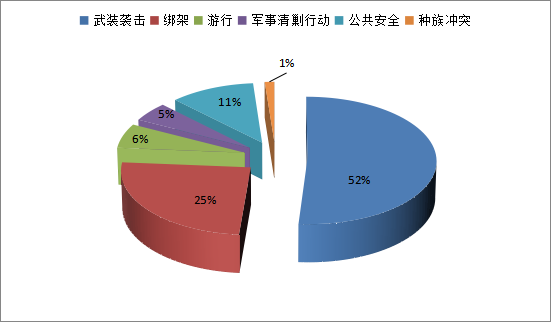
Chart 3: Classification Statistics of Deaths in April
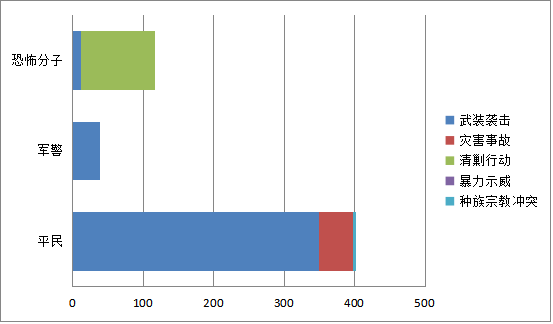
Chart 4 Comparison of the Number of major Security Incidents in April and March
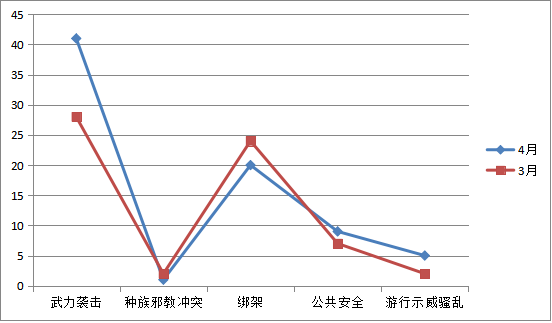
Ii. Risk Early Warning and Prevention Suggestions
Chart 5 Recent Warnings of Social Security Risks in Nigeria
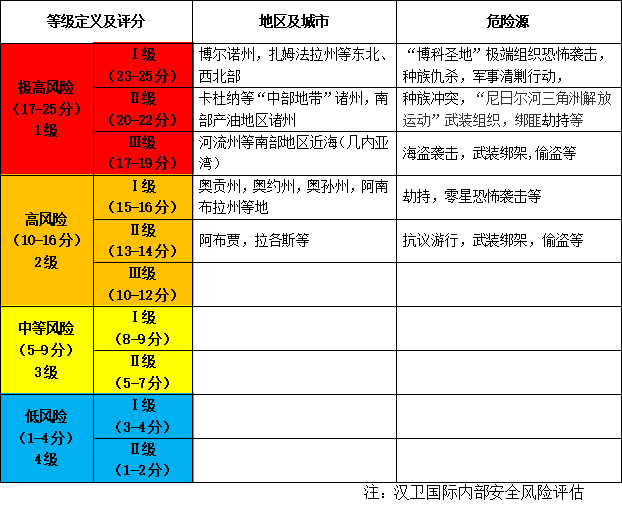
Given the complex social environment and high-risk security assessment in Nigeria, the following security measures are recommended:
The first is to provide full-time security services during travel.In remote rural areas of Nigeria, the police force is limited and the road infrastructure is poor. As a result, the response of security forces to violent crimes and riots and conflicts is often seriously delayed. Therefore, Chinese-funded enterprises and others should promptly obtain the latest local security intelligence, conduct specific security assessments of the travel destinations, and have security personnel accompany and protect them.
Second, be highly vigilant against the risk of kidnapping.In April, armed attacks and kidnappings occurred frequently in Nigeria, and incidents of Chinese citizens being kidnapped occurred again. For this reason, it is reminded that Chinese-funded enterprises and individuals in Nepal should pay close attention to the safety dynamics around camps, accommodation and residences, and observe the activities of suspicious and unfamiliar persons. Try to minimize going out. If you need to go out, strengthen security measures for your travel. Do not disclose your whereabouts in advance. Pay attention to choosing multiple routes to avoid being figured out by lawbreakers about your travel patterns. Avoid traveling at night or alone. Do not go to remote or sparsely populated places.
Third, pay attention to flood prevention during the rainy season.According to the forecast of the Nigerian Meteorological Service, the rainy season of 2025 has arrived, and preparations for flood prevention should be made. The Nigerian Hydrological Services (NIHSA) issued a warning on April 17, listing Lagos as a high-risk area for floods in 2025. Some areas of the state, including Lagos Island, Lekki, Victoria Island, Ikoi and Aja, may suffer from severe floods due to heavy rainfall, rising sea levels and overburdened drainage systems. The Lagos state government stated that it has deployed flood control teams to accelerate the cleaning of drainage systems and called on residents to avoid littering and blocking waterways. In addition, the continuous high temperatures in northern Nigeria are intensifying the risk of floods. According to the monitoring data of the Nigerian Meteorological Bureau, the temperature in 18 states including Kano and Borno has exceeded 40℃. The hot and humid weather poses a hidden danger for the flood season. Borno, Jigawa and 30 other states will face the threat of severe floods from April to November.
Fourth, effectively avoid risks. Most of the attacks in Nigeria occurred in the northeastern and central-northern parts, especially in Maiduguri in the central part of Borno State, the roads connecting other major towns, the areas bordering Niger, and Zamfarah State. Recently, security incidents have occurred frequently in Kaduna State and Abuja. In the event of a terrorist attack, one should follow the official instructions and get in touch with their specific security service provider to receive timely assistance. Video surveillance is installed at the base, shops, warehouses and residences, and facilities such as trenches, high walls, barbed wire, anti-collision barriers, buffer zones and alarm systems are set up in the camps to strengthen military and police security forces and expand the defense range. At the same time, it is necessary to avoid lingering near areas that may become targets of armed attacks, including government and security force facilities, landmark buildings and religious sites, etc. In Nigeria, it is particularly important to minimize stays in densely populated public places such as the northeastern region, religious festival sites, areas where ethnic groups live together, regions with a high incidence of crime (especially highways and areas where piracy is active in the Gulf of Guinea), oil and gas facilities, government and military camp facilities, diplomatic embassies, religious worship places, schools, markets, refugee camps, bus hubs, and surrounding areas Time.

